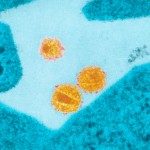Link to Pubmed [PMID] – 19414780
J. Immunol. 2009 May;182(10):6267-77
IL-2 and IL-15 differentially control the development, activation and proliferation of human NK cells, although they share common signal-transducing receptor chains CD122 and common gamma. To explore this issue, we analyzed in detail the kinetics of cytokine receptor expression, cytokine binding, and signaling responses in human NK cells treated with common gamma-chain family cytokines. We provide evidence for the sequential expression of IL-15Ralpha and IL-2Ralpha at the surface of cytokine-stimulated human NK cells, independent of the cytokine used for stimulation (IL-2, IL-15, or IL-7). Binding experiments confirmed the switch of high-affinity receptor from IL-15R to IL-2R between 18 and 48 h after stimulation. Consequently, phospho-STAT5 signaling responses to IL-15 were efficient in human NK cells pretreated with cytokines for 18 h, but were abolished at 48 h. Functional NK cell responses to IL-15, including IFN-gamma secretion and CD107a expression, followed a similar pattern, indicating the physiological relevance of the cytokine receptor switch. Importantly, IL-15 complexed to soluble IL-15Ralpha preserved the capacity to activate cytokine-stimulated human NK cells at 48 h, suggesting that human NK cells remained competent for IL-15 trans-presentation, while they had become refractory to free diffusible IL-15. These findings define a common cytokine receptor expression program, which increases human NK cell sensitivity to free IL-15 in early activation and redirects responses toward IL-2 and trans-presented IL-15 at later stages. Such a program may prevent excessive human NK cell activation by effectors of innate immunity and regulate the transition between the innate and adaptive stages of immune responses.

